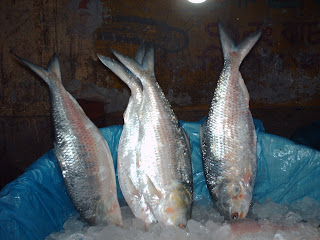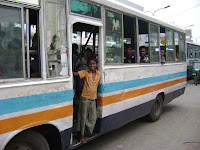Beggars are found in the villages, in towns and cities. In a word, beggars are found begging every where in Bangladesh. Mainly they gather on Friday near the mosques in the towns, bus stand, railway stations, in front of markets, and in the traffic signals. Most of the beggars are unable bodied. Some are blind, and some are lame. Some boys and girls are also found begging in the streets. Those who are very poor, landless or helpless may beg but some able bodied beg being averse to work. During the rainy season poor people of rural areas come to Dhaka for begging alms. They lead very miserable life. At the bus stand, market place and in the traffic signals old beggars and beggar children stretch their hands for taka (money). They cause troubles.
.jpg)
Sometimes they cause accident. It is a great problem in Dhaka or in the Bangladesh. Now a days they play many tricks to draw the attention of the people. Many falsehoods are being played by them. Many of them recite verses from the holy “The Quran” and some are found singing Islamic Gazal (song). While begging in the street some of them utter peculiar sound to draw the attention of the passers-by. Some of them carry testimonial of the local chairman or from any important person, or from the physicians to help them for the time being. Some beg for the treatment, some for the help of his daughter’s marriage. There are countless false tricks they apply. Children also take some tricks to beg. Sometimes they sell used/stale flowers during traffic signal, sometimes they beg in the park saying false story like as I have not take any food whole day, my step mother does not give me food etc. then they try to cry but few minutes later they laugh.
In some places some beggars are proved cheaters. Some able bodied are found pretending lame, blind or dump. Some healthy beggars pretend to be patients. Women beggars are mostly divorced or widow or bereaved of their husbands or parents.
.jpg) A mosque, two gates near Nari Jibon office where were thirty six beggars Photo: One blind beggar going to beg to door to door by the help of his wife. They live in Khilgoan Railgate slum From a research on three husband beggars living at Modhupur thana in the district of Tangail it is known that all three hundred beggars are landless. Some of them may have the minimum land only for living or shelter but most of them live in other people’s home. Some of them live in the hut built by the road side. Some of them have their son or sons who are day laborers. Their sons’ also have a needy family. Their daughters generally work as maid servants from the childhood. Their daughters somehow get married by the help of employers or others with landless day laborers. The rural beggars are mostly above sixty. There is some interesting information in the beggars’ society which many of us don’t know. There are some rules to be involved in the beggars’ society or to be a professional beggar. Though there is no organized association of the beggars, they form unauthorized unity. Usually in the thana level or big bazaar area they have a fixed place where they meet hat day. There they can discuss their problem. They select one leader among them and they also select leaders (group leader) in the rural area. These leaders have religious knowledge than others. Under this leadership beggars must oblige some rules such as they beg alms in an area or in a village on the fixed day. None can beg after lunch time or Zohar namaz. None of them can violet the rule. Before starting begging beggar one must seek permission from the villagers. Having permission one has to take oath from the group leader. Group leader give him a stick of bamboo or wood and a begging bag. If a person involve in begging profession he could not quit the begging profession ever. Whole life he will continue begging and most of the time he will pray and obey the religious rules. He will pass his whole life in the way of religion. New beggar will invite some old beggars at the starting time. Beggars can not engage in any profitable business or income generating activities. They have a proverb that if any person fall in serious sick and then if he sacrifice his life in begging profession, Allah will recover him. We found some able bodied beggars who sacrificed his life in begging profession. One may beg alone or many in a group. But we have found some beggars who violet their rules. In the rural area have some beggars who are not professional they come seasonally facing serious problem for a while. In the village if you need some more beggars for a big function you need to inform only one beggar or rural beggars’ leader then they will collect how much you need.
A mosque, two gates near Nari Jibon office where were thirty six beggars Photo: One blind beggar going to beg to door to door by the help of his wife. They live in Khilgoan Railgate slum From a research on three husband beggars living at Modhupur thana in the district of Tangail it is known that all three hundred beggars are landless. Some of them may have the minimum land only for living or shelter but most of them live in other people’s home. Some of them live in the hut built by the road side. Some of them have their son or sons who are day laborers. Their sons’ also have a needy family. Their daughters generally work as maid servants from the childhood. Their daughters somehow get married by the help of employers or others with landless day laborers. The rural beggars are mostly above sixty. There is some interesting information in the beggars’ society which many of us don’t know. There are some rules to be involved in the beggars’ society or to be a professional beggar. Though there is no organized association of the beggars, they form unauthorized unity. Usually in the thana level or big bazaar area they have a fixed place where they meet hat day. There they can discuss their problem. They select one leader among them and they also select leaders (group leader) in the rural area. These leaders have religious knowledge than others. Under this leadership beggars must oblige some rules such as they beg alms in an area or in a village on the fixed day. None can beg after lunch time or Zohar namaz. None of them can violet the rule. Before starting begging beggar one must seek permission from the villagers. Having permission one has to take oath from the group leader. Group leader give him a stick of bamboo or wood and a begging bag. If a person involve in begging profession he could not quit the begging profession ever. Whole life he will continue begging and most of the time he will pray and obey the religious rules. He will pass his whole life in the way of religion. New beggar will invite some old beggars at the starting time. Beggars can not engage in any profitable business or income generating activities. They have a proverb that if any person fall in serious sick and then if he sacrifice his life in begging profession, Allah will recover him. We found some able bodied beggars who sacrificed his life in begging profession. One may beg alone or many in a group. But we have found some beggars who violet their rules. In the rural area have some beggars who are not professional they come seasonally facing serious problem for a while. In the village if you need some more beggars for a big function you need to inform only one beggar or rural beggars’ leader then they will collect how much you need.
 Income source of beggars: In the Muslim society, there are some Islamic or religious values that encourage the people to give alms to the beggars. Those are as follows; “if a beggar comes to beg on horse back he should not be avoided.” The Muslims offer their food grains to the beggars at first before eating the new food of the new seasons. The Muslims offer money or rice to the beggars for the purpose of gaining good benefit of his business. The Muslims also offer new fruits of new trees to the beggars. After the death of any relative the Muslims entertain beggars to get blessings from Allah. The Muslims try to get the good wishes of Allah by helping the beggar. They give away sadga, fitra and jakat to the beggars. (Sadga means one man one day food where are 1kg rice, slight salt and something like curry, many families in the villages offer sadga every week).
Income source of beggars: In the Muslim society, there are some Islamic or religious values that encourage the people to give alms to the beggars. Those are as follows; “if a beggar comes to beg on horse back he should not be avoided.” The Muslims offer their food grains to the beggars at first before eating the new food of the new seasons. The Muslims offer money or rice to the beggars for the purpose of gaining good benefit of his business. The Muslims also offer new fruits of new trees to the beggars. After the death of any relative the Muslims entertain beggars to get blessings from Allah. The Muslims try to get the good wishes of Allah by helping the beggar. They give away sadga, fitra and jakat to the beggars. (Sadga means one man one day food where are 1kg rice, slight salt and something like curry, many families in the villages offer sadga every week).
Some time people in the village or towns promise in mind to give money to the beggars if he/she faces any serious problem or diseases or danger to be recovered. On the basis of the religious faith the Muslims feed the beggars to their heart’s content in any Islamic festival. For the purpose of any bigger function they invite them through the group leader. The beggars of rural areas gather in the market day. In towns they are mostly found in the bus stand, railway station, or in the launch ghat where there is crowd of people.
There is no unity in the beggar women. They do not get Sadga or any kind of beg offering. Usually they don’t follow beggars’ rules. They can go far from their dwelling place. But they attend the bigger festival or function with the help of the women of that house. Besides, beggar women work as messengers of the village women to carry massage to their relatives. They don’t receive as much beg as the male beggars receive.
.jpg) The male beggars are called Fakir and the female beggars are called Fakirnee. This is the real picture of the beggars of Bangladesh.
The male beggars are called Fakir and the female beggars are called Fakirnee. This is the real picture of the beggars of Bangladesh.










 These small tea shops are on the drain and they throw almost all of their unnecessary things in the drain.
These small tea shops are on the drain and they throw almost all of their unnecessary things in the drain. 












.jpg)
.jpg)

.jpg)